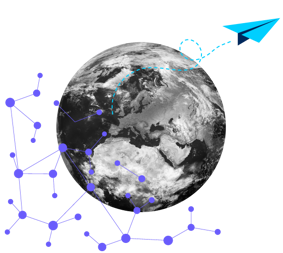- The CBI chevron_right
- Promoting gender balance in the logistics industry
Promoting gender balance in the logistics industry
In an industry perceived as male-dominated, FedEx is using the power of employee networks to drive change.
Over the past few years, we have seen considerable progress on gender equality within the workplace. Businesses across the UK have been implementing Diversity, Equity & Inclusion teams and strategies, helping ensure more inclusive recruitment practices and outlining their commitments to building a more diverse pipeline of talent across all levels.
However, the logistics sector has historically attracted more men than women. Nearly 1.5 million people work in transport and logistics in the UK, but less than a quarter of these are female, according to the UK Commission for Employment and Skills. Whilst we as an industry are making progress to counter this imbalance, we need to significantly ramp up efforts to address this issue.
This historical lack of women within the industry may be due to a common misconception that career paths for women in logistics were somewhat limited. In today’s world of e-commerce and business development, the scope of career opportunities is much broader across a variety of departments. However, when people think of logistics companies like FedEx, most people still think of the drivers we see every day delivering our parcels. This misunderstanding is in part due to a combination of education and visibility and in order to promote a more inclusive career for all, we need to highlight the vast array of roles available, from couriers and drivers to office-based and field employees.
One approach to raising awareness that any business should consider is to establish employee networks. At FedEx, we launched the UK’s Women’s Inclusion Network (WIN) last year. We have so many great women in the business across all functions and levels, and this network enables them to share their experiences and learn from one another, which in turn helps support career progression and development. By establishing a support, development, and mentoring network, we are championing, increasing, advancing and retaining the number of females at all levels and we’re now rolling this initiative out across Europe.
Logistics is fundamental to industries and business sectors across the world, and at FedEx, our aim is to attract a diverse workforce so that we can best meet the needs of our varied customer base. In order to understand and meet the needs of our customers, we need to be recruiting diverse talent with a varied skillset and experience across multiple industries.
It is essential that the logistics industry has more initiatives like the FedEx WIN, which will help develop in-house talent and cultivate skills from inside our business to support the career development of all individuals.
Ultimately, the logistics industry will only be able to attract the right talent and overcome perceptions of being a male-dominated environment by better promoting the scope of opportunities available for each and every one of us. We should relish and fully embrace the diversity of skills which, in turn, will help us strengthen business resilience, propel innovation and continue to meet the ever-changing needs of our customers.
About Louise Whitehouse:
As Managing Director, Fleet Maintenance Europe, Louise is responsible for fleet maintenance across Europe, including managing more than 20,000 individual assets and being responsible for embedding the corporate vision. Louise has also taken on the additional tasks of founding and leading the Women’s Inclusion Network (WIN) at FedEx in the UK, established to increase, advance and retain the number of females at all levels of the organisation.
Explore the effect of COVID-19 on diversity and inclusion, and how business can make diversity a priority at the fourth CBI Diversity & Inclusion Conference, 30 November - 1 December. Click here to secure your place.
CBI members get unlimited tickets to attend this conference. Non-members get complimentary access to selected sessions.


